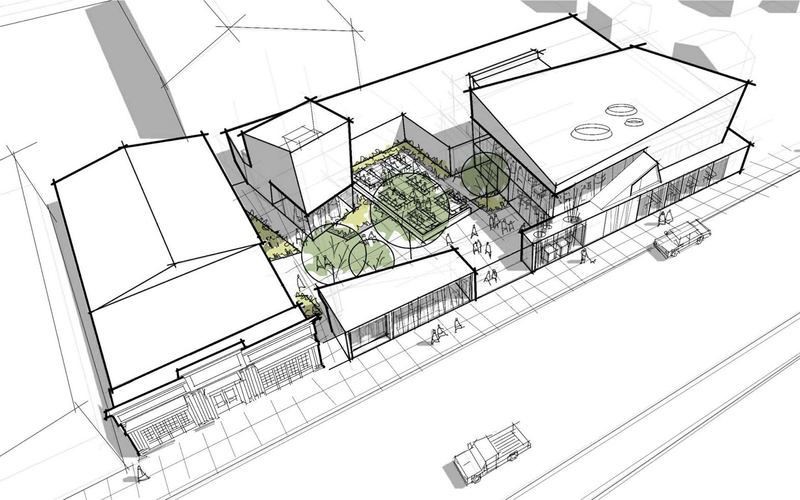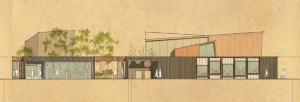Dogfish Head plans for new restaurant denied
Plans for Dogfish Head Brewing and Eats to build a new, larger restaurant were denied by Rehoboth Beach Board of Adjustment by a 3-1 vote.
Nick Benz, CEO of Dogfish Head, said the company plans to appeal the case to Delaware Superior Court.
"We plan to go to the Superior Court so we can build a world class brewpub experience for the benefit of Rehoboth, Dogfish, and our neighbors on Rehoboth Avenue,” he said.
Under its proposed plan, Dogfish would have demolished the current 8,280 square foot restaurant at 320 Rehoboth Ave. and built a new, 9,820 square foot restaurant on the same site.
“We are stunned and disappointed with the outcome," Benz said. "We believe we met the full criteria for the variance, especially given the fact that we’re already over 5,000 square feet."
At the board's April 27 meeting, Dogfish attorney Mark Dunkle said the restaurant faced exceptional practical difficulty because if it could not expand, the restaurant would not be competitive. He said Dogfish could not remain competitive under the 5,000 square foot limitation on restaurants. Dunkle said the change is designed to modernize the restaurant while maintaining its use and character, arguments similar to those offered by Nicola Pizza when it sought to expand four years ago.
Benz said the building is outdated. “It’s an old building. It’s not just the skin, it’s the bones that have become dated. It’s time,” Benz said.
He said from Dogfish’s perspective, the building is an eyesore for the city of Rehoboth, and Dogfish wanted to have a building the community could be proud of. He said residents who lived behind Dogfish see a dumpster and propane tanks. Benz said he also hoped the changes would provide a better experience for guests and employees.
“We can do better,” Benz said.
Dogfish was required to get a variance because it is a legal nonconforming property. While no one seemed to know exactly how old the existing building is, everyone agreed that it predates the zoning code, passed in 1991, meaning it was grandfathered in. However, city code says when a nonconforming property substantially changes its floor plan, it must comply with the zoning code or get a variance.
Although Dogfish has not yet applied for a building permit, plans call for a reducing seating from 250 to 245 with a slight increase in overall floor area. The proposal presented to the board did not include neighboring Finbar, which Dogfish Head purchased in December 2013.
Benz said the project also calls for fixing the porch that juts out onto the sidewalk and adding an office for the management team.
“We’re here to upgrade and improve this restaurant,” Dunkle said.
Benz said while the seating would have been reduced, the restaurant will be roomier, allowing more space between the bar and the tables.To get that, Dogfish will give up the parking lot adjacent to the building, moving all parking to the street and building a courtyard. Benz said the proposed design would make it safer for guests waiting for a table and reduce crowding on the sidewalk. The project would also improve drainage and reduce noise affecting neighboring property owners, Benz said.
Board member Clif Hilderley was skeptical of the plan, saying it was strictly based on economic factors.
“You want to expand downtown where it is already crowded?” he asked.
Hilderley said Dogfish should look outside of town if they want to expand as much as they are asking for.
“It’s not a place to expand a restaurant,” he said.
“This isn’t to get more people in the building. This is to make a better experience,” Benz replied.
After the meeting, Benz said, "We certainly decline to take the advice of one member of the board who suggested we simply move out of town rather than build a great brewpub building on Rehoboth Avenue. We think his real opposition was architectural and design in nature, looking for something more traditional versus Dogfish off-centered. That’s not a basis to turn us down, and it’s not part of the testing requirement for a variance."
Board member Chuck Donahue said the proposed building is very modern and not really keeping with the character of the surrounding area. Dunkle said the building fits in with an area zoned commercial.
The board may grant a variance based on hardship or an exceptional practical difficulty. Under the hardship standard, financial considerations cannot be presented as a hardship. However, City Solicitor Glenn Mandalas said case law has ruled that a variance based on exceptional practical difficulty can be based on financial factors.
Executive chef Kevin Downey and general manager Ryan Schwanberger said the building is falling apart, and the new building will provide a much better experience for customers and a better working environment for employees.
Donahue said Dogfish’s only motive in seeking the variance is to expand its profit. Under its proposal, the restaurant would be double the size allowed by the zoning code. Donahue said the modern-looking proposed structure was completely out of character with the rest of the neighborhood.
Chairman Thomas Evans was the only one in favor of the plan, saying Dogfish was a good business that was not asking for a very large variance from what they have now.
While the board always says it does not establish precedent, a number of restaurants larger than 5,000 square feet have come before the board in the last five years and received variances, such as The Cultured Pearl, The Greene Turtle on Wilmington Avenue and Grotto Pizza. In that time, other than Dogfish, the only other restaurant over 5,000 square feet to be denied a variance was Stingray Sushi Bar and Asian Latino Grill, which subsequently filed a lawsuit and won its right to build a new patio.
Ryan Mavity covers Milton and the court system. He is married to Rachel Swick Mavity and has two kids, Alex and Jane. Ryan started with the Cape Gazette all the way back in February 2007, previously covering the City of Rehoboth Beach. A native of Easton, Md. and graduate of Towson University, Ryan enjoys watching the Baltimore Ravens, Washington Capitals and Baltimore Orioles in his spare time.


























































